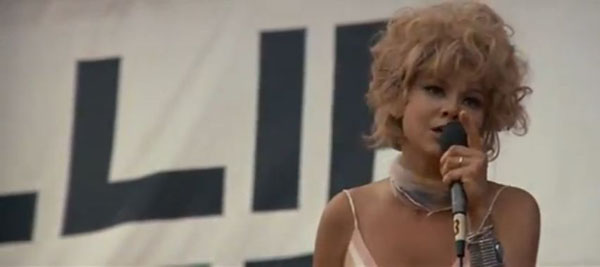Criterion’s released a Blu-ray edition of Robert Altman’s Nashville (1975) and, at DVD Beaver, Gary W. Tooze calls it “One of the best Blu-ray packages I’ve seen this year.” As for the image, there’s little to say “except ‘OMG’.”
The package includes Molly Haskell‘s marvelous essay, which begins: “If Robert Altman’s radically freewheeling, multicharacter country-music extravaganza didn’t revolutionize filmmaking as some of its partisans predicted it would, it did capture as no other film has ever done the full complexity of America, rich with contradictions, rife with neurosis, and convulsed by the celebrity madness of ambition and envy. Nor does the film seem dated forty years later. If anything, the America that Nashville doled out with stunning prescience in 1975 has become only more so in the subsequent four decades—more addled, its politicians more outrageous, its fundamentalists more strident, its divas more delusional, the lines separating news, politics, and entertainment more blurred than ever.”
“Nashville isn’t trying to be docu-realistic when it comes to Nashville itself,” writes Noel Murray, who’s from Nashville, at the Dissolve. “This is something a lot of actual Nashville residents—in the music industry especially—didn’t get back in 1975. (My friend Jim Ridley examined the whole local kerfuffle over Nashville in this well-researched 1995 Scene article.)” And “the movie’s version of country music, while tuneful, is intentionally cartoonish. Which means that as part of coastal critics’ apparently eternal need to protect defenseless middle-Americans from mean-spirited showbiz types like Alexander Payne, the Coen brothers, and Robert Altman, some tastemakers grumbled about Nashville, claiming Altman was making fun of hicks and disrespecting a grand tradition of American folk music.” But Altman was more concerned with making “a grand statement about celebrity, politics, the deep-rooted conservatism of the South, and a nation on the cusp of its bicentennial.”
“Stunningly, it isn’t even Altman’s best film (that would be McCabe & Mrs. Miller),” writes Chuck Bowen for Slant, “but Nashville is still the movie that best embodies everything that was so freeing and generous and deceptively casual about Altman’s art, and it’s the film that best represents him as a uniquely American artist.”
Clayton Dillard for Cinespect: “If the cultural capital in Nashville hinges upon its covert doubling of Nashville for Hollywood, where meaning results from awards recognition and party-based hobnobbing, then these qualities have not so much dissolved in contemporary social environments as morphed into an intensified selfsploitation at the benefit of an intangible, imperceptible force doling out numbing quantities of information. Just as [the fictional presidential candidate ] Hal Phillip Walker never shows his face, the puppeteers pulling the strings of late capitalism remain hidden in the ether or, even, the heavens, which is precisely the direction of the film’s final, tilting shot. There is no American masterpiece more prescient than and still as urgent as Nashville.”
Ronee Blakley, who was nominated for an Oscar for her performance as country singer Barbara Jean, talks with Tyler Coates (Flavorwire), Will Harris (Dissolve), and Hillary Weston (BlackBook). And about a month ago now, the Hollywood Reporter ran a lengthy piece by Mike Kaplan, associate producer on Short Cuts (1993) and producer of the documentary about its making, Luck, Trust & Ketchup: Robert Altman in Carver Country (1993).
Update, 12/6:
Update, 12/7: Nick Dawson interviews screenwriter Joan Tewkesbury for Filmmaker.
Updates, 12/25: “Part of what makes Nashville such a heady experience is the seemingly effortless way Altman introduces each new thread of his immense tapestry, as his camera glides away from one prickly interaction to pick up somebody else who happens to be strolling by,” writes Mike D’Angelo at the AV Club. As for the ending: “It’s at once ridiculous and genuinely inspiring—Robert Altman in a nutshell.”
Jonathan Rosenbaum has posted his 1975 review for Sight & Sound, wherein he writes that “if Nashville is conceivably the most exciting commercial American movie in years, this is first of all because of what it constructs, not what it exposes.”
“Nashville is as durable as it is in part because it refuses to pander either to those seeking facile, cynical satire or those wanting a reverent, humourless homage to country & western,” writes Josef Braun. “Generous but never ingratiating, funny but never cheap, this is a sprawling, wildly ambitious film that to my eyes and ears only gets better with age. It’s taken me this long to realize just how revolutionary Nashville truly was, not only in its insistence on maintaining a boggling panorama of protagonists, but in its use of multi-track sound recording and mixing to capture and pluck out snippets of dialogue from multiple characters within a single roaming shot. Altman’s was not merely an enormous technical accomplishment but also an unprecedented way of altering the very nature of cinematic storytelling.”
And you’ll find the screenplay at Cinephilia and Beyond.
For news and tips throughout the day every day, follow @KeyframeDaily on Twitter and/or the RSS feed. Get Keyframe Daily in your inbox by signing in at fandor.com/daily.




